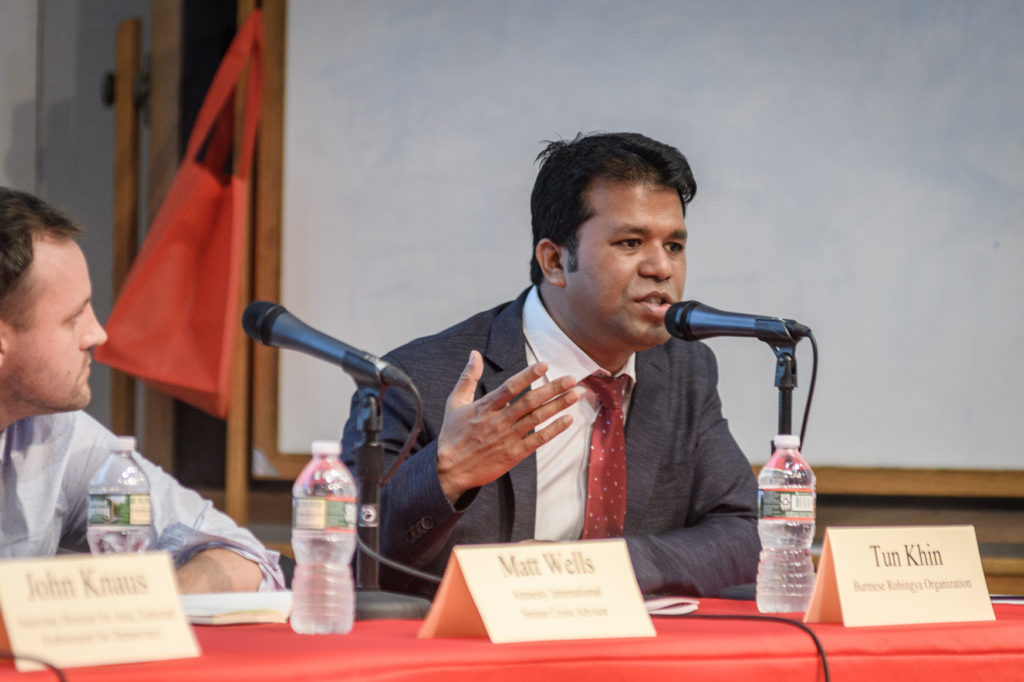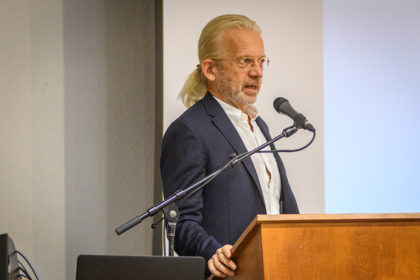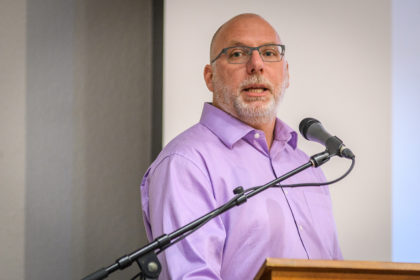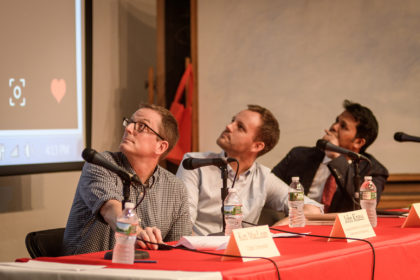Rohingya atrocities denounced at Clark panel

Several weeks after a U.N. report condemned Myanmar military leaders’ systematic violence against Rohingya Muslims, a panel of experts visited Clark University to discuss what the international body has called a “textbook case of ethnic cleansing.”
Nearly 1 million Rohingya fled Myanmar, historically known as Burma, after a military assault on villages in northern Rakhine State in August 2017. The military claims it was responding to rebel attacks, but the U.N. report rejects that notion, stating, “Military necessity would never justify killing indiscriminately, gang raping women, assaulting children, and burning entire villages.” The report recommends the case be referred to the International Criminal Court (ICC) for investigation of genocide.

The Sept. 20 discussion on “The Past, Present, and Future of the Rohingya Crisis” drew many students, faculty, and friends of Clark’s Strassler Center for Holocaust and Genocide Studies, which offers the world’s only Ph.D. in Holocaust history and genocide studies.
In his opening statements, Thomas Kühne, director of the Strassler Center, highlighted the expertise of Ken MacLean, associate professor of international development and social change in the School of International Development, Community, and Environment, a faculty member in the Strassler Center, and director of Clark’s Asian Studies Program. MacLean organized the event and recently wrote about the crisis in the Journal of Genocide Research.
In his article, “The Rohingya Crisis and the Practices of Erasure,” MacLean notes “how the progressive erasure of citizenship shapes the progressive erasure of home and vice-versa, with the result being the largest cross-border humanitarian crisis in Asia today. In 2015, most estimates placed the total number of Rohingya in northern Rakhine State at one million people. In 2018, after two years of violence, fewer than one-tenth of them are thought to remain.”

MacLean introduced a panel of experts who have been immersed in the crisis: Tun Khin, president of the Burmese Rohingya Organization UK; John Knaus, associate director for Asia at the National Endowment for Democracy; Matt Wells, senior crisis adviser for Amnesty International; and, via Skype from Bangkok, Debbie Stothard, director of Altsean-Burma and secretary general of the International Federation for Human Rights.
Knaus set up the historical context for the present crisis, then handed the floor to Tun Khin, a native of Arakan, renamed Rakhine State by the military junta in the 1990s. A Rohingya Muslim, Tun Khin recounted examples of crimes including rape, murder, and burning of villages, along with the day-in-and-day-out injustices that keep the Rohingya from freely marrying, voting, traveling, attending college, owning land, practicing their religion, and speaking out.
“What is happening to the Rohingya is genocide. It’s systematic, intentionally destroying our community,” he said. “We want justice. We need protection from the international community. I feel no safety. At any time, I can be killed by the military.”
Tun Khin also called for the international community to care for Rohingya living in refugee camps in Bangladesh. Many, he fears, have become victims of human trafficking. “We want to live peacefully in our country,” he said.
Wells described systematic, targeted violence by a “highly professional military that consistently acts in unprofessional ways. This is not a military with an unclear chain of command. This not a military in which field commanders on the ground do their own thing, absent those above.” Rather, the highest-level commander has been “intimately involved” in operations, visiting Rakhine State and posting progress updates as well as hate speech daily on Facebook. “This is a highly orchestrated campaign from the senior most levels of the military,” he said.

More recently, while the government speaks of repatriation of refugees, Wells said, authorities have been bulldozing and building over Rohingya villages, “making it impossible for families to move back to their homes.”
Three actions need to occur before the Rohingya can return, he said, including granting them citizenship; prosecuting those who have committed atrocities against them; and ending the “apartheid” that has existed in Rakhine State for at least six years. Unfortunately, according to Wells, the current politics of the United States – with National Security Adviser John R. Bolton calling the International Criminal Court illegitimate – make it virtually impossible for the U.S. government to “support the actions that are needed.”
Stothard described China’s involvement in Rakhine State, where it has invested $8 billion to $10 billion in infrastructure improvements, including a deep-sea port and pipelines routing oil and gas from Sudan. Meanwhile, Myanmar’s military has received a 175 percent increase in its budget since 2011.
“There are three economic zones being built on … land created by racist violence. We do need to consider how economics comes into this” crisis, she said. “[Genocide] is big business for the military.” As Myanmar’s largest trading partner, China has largely supported the military government publicly and in the United Nations.
Sponsors of the Sept. 20 discussion in Jefferson Academic Center included Judith T. ’75 and Lawrence S. ’76 Bohn; the Asian Studies, Peace Studies, Women’s and Gender Studies, International Development programs; the School of International Development, Community, and Environment; STAND, a student-led movement to end mass atrocities; the Political Science Department through the Chester Bland Fund; and the Asian Studies Program at the College of the Holy Cross.


